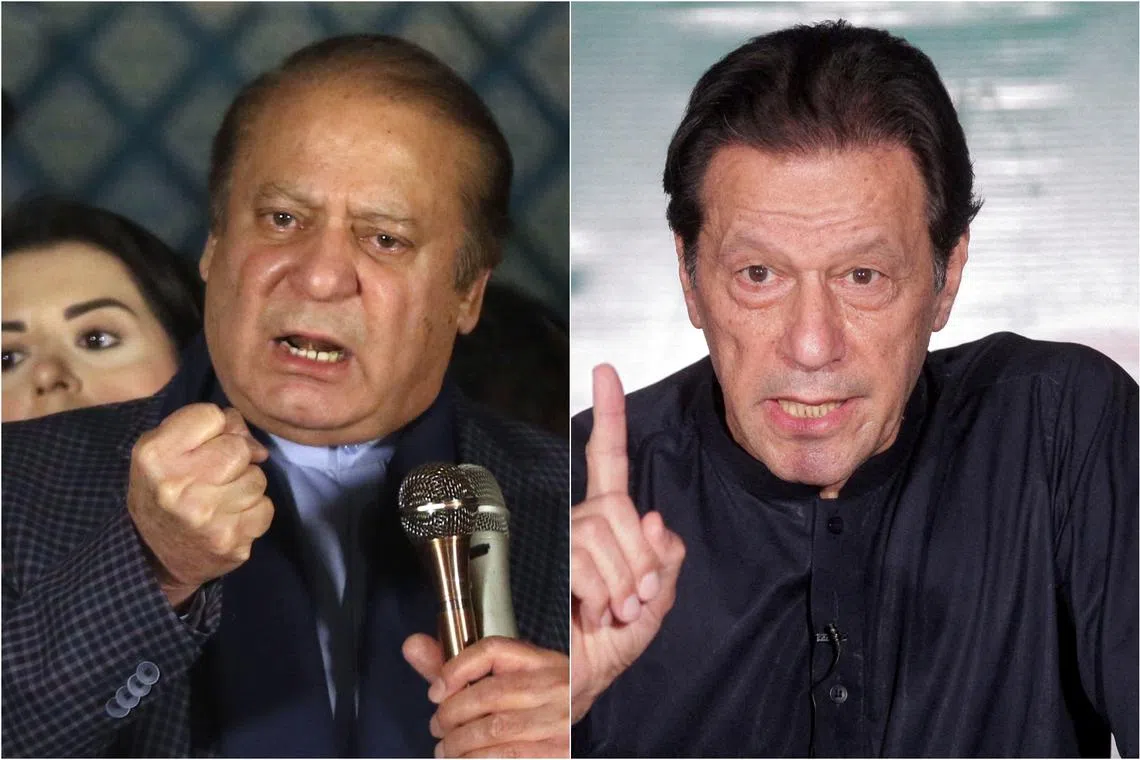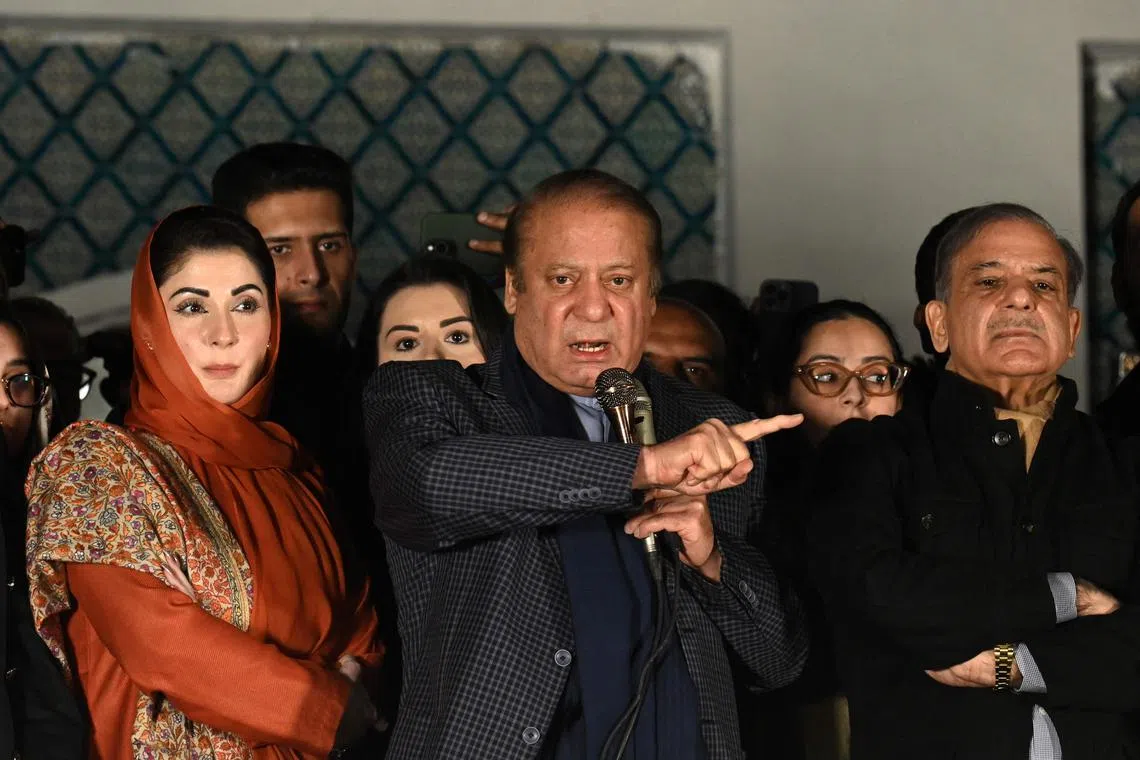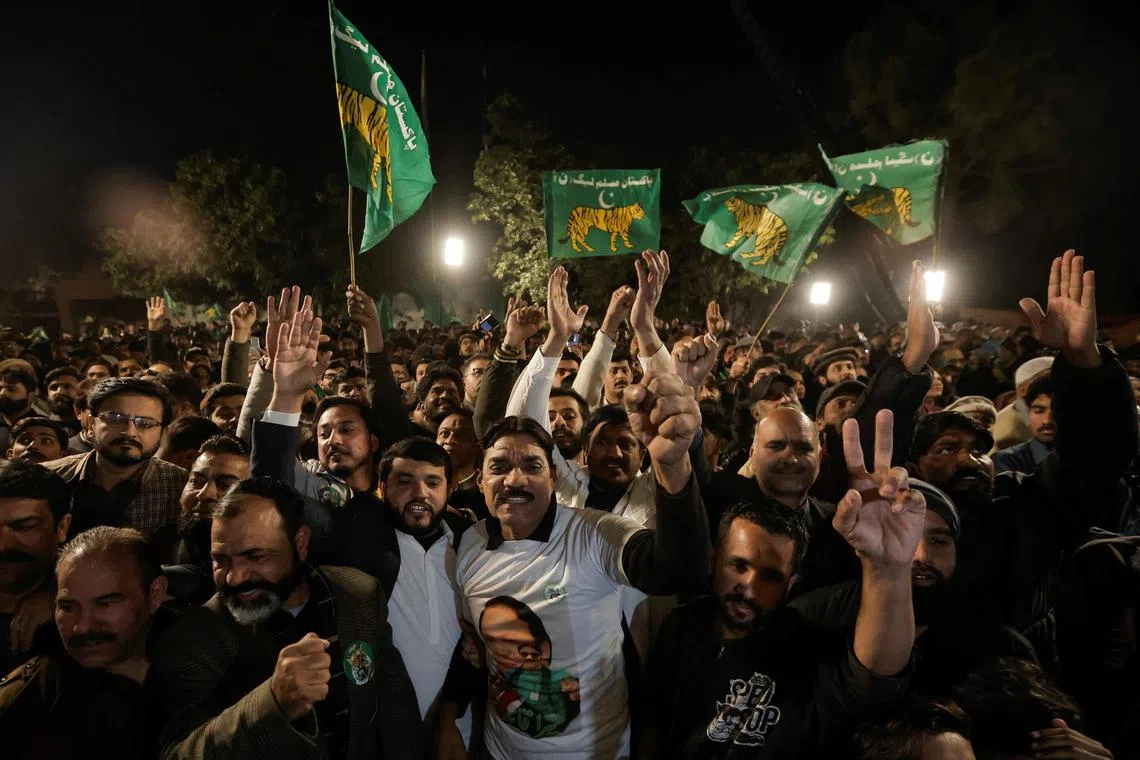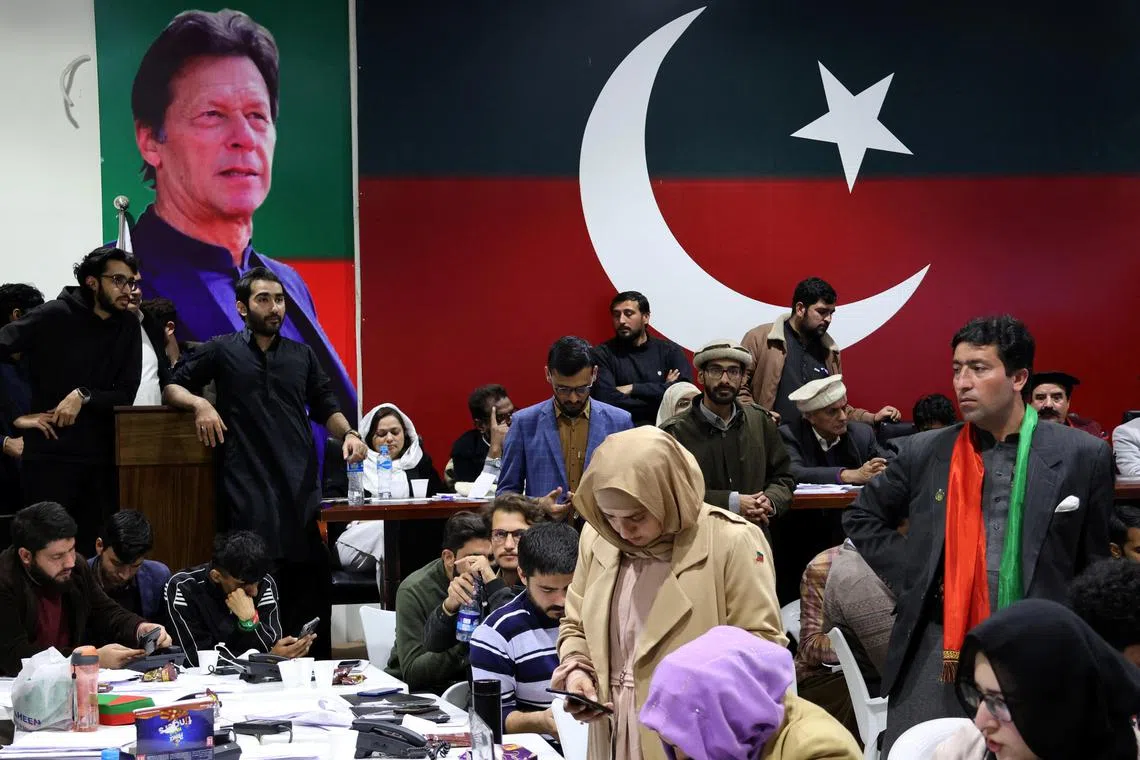Pakistan ex-PM Imran Khan’s party aims to form government, wants election results released
Sign up now: Get insights on Asia's fast-moving developments

Mr Nawaz Sharif’s (left) party won the most seats by a single party in the Feb 8 election, but supporters of imprisoned Imran Khan won the most seats overall.
PHOTOS: AFP, REUTERS
ISLAMABAD - Candidates backed by former Pakistani prime minister Imran Khan’s party plan to form a government and call on their supporters to peacefully protest if final election results are not released, a senior aide to the jailed politician said on Feb 10.
Khan and another former prime minister, Mr Nawaz Sharif, on Feb 9 both declared victory in elections marred by delayed results and militant attacks, throwing the country into further political turmoil.
Mr Gohar Khan, chairman of Khan’s Pakistan Tehreek-Insaf (PTI) party and who also acts as Khan’s lawyer, called on “all institutions” in Pakistan to respect his party’s mandate.
At a news conference, he said if complete results of the polls were not released by the evening of Feb 10, the party would hold peaceful protests on Feb 11 outside government offices returning election results around the country.
Mr Sharif’s party won the most seats by a single party in the Feb 8 election, but supporters of Khan, who ran as independents instead of as a single bloc after his party was barred from the polls, won the most seats overall.
Mr Sharif said his party was also talking to other groups to form a coalition government, as it had failed to win a clear majority on its own.
His announcement came after more than three-quarters of the 265 seats had declared results, more than 24 hours after polling ended on Feb 8, when 28 people were killed in militant attacks.
Analysts had predicted there may be no clear winner, adding to the woes of a country struggling to recover from an economic crisis while it grapples with rising militancy in a deeply polarised political environment.
Nonetheless, Pakistan’s army chief praised the “successful conduct” of the elections, saying the country needed “stable hands” to move on from the politics of “anarchy and polarisation”.
General Asim Munir said in a statement he “wishes that these elections bring in political and economic stability and prove to be the harbinger of peace and prosperity for our beloved Pakistan”.
The United States, Britain and the European Union on Feb 9 each expressed concerns about Pakistan’s electoral process, urging a probe into reported irregularities.
British Foreign Secretary David Cameron cited “serious concerns” raising questions “about the fairness and lack of inclusivity of the elections”.
Pakistan’s foreign office countered the international criticisms on Feb 10, saying they ignore the “undeniable fact” of Pakistan conducting elections successfully.
“Pakistan Muslim League is the single-largest party in the country today after the elections, and it is our duty to bring this country out of the whirlpool,” Mr Sharif told a crowd of supporters gathered outside his home in the eastern city of Lahore.
“Whoever has got the mandate, whether independents or parties, we respect the mandate they have got,” he said.
“We invite them to sit with us and help this wounded nation get back on its feet.”
Khan’s PTI party released an audio-visual message created using artificial intelligence and shared on his X social media account.
In the message, which is usually delivered by word through his lawyers, Khan, 71, rejected Mr Sharif’s claim to victory, congratulated his supporters on “winning” the election and urged them to celebrate and protect their vote.
“I trusted that you all would come out to vote – and you honoured that trust and your massive turnout has shocked everyone,” the message said, adding that no one would accept Mr Sharif’s claim because he had won fewer seats and because there had been rigging in the polls.

Mr Nawaz Sharif (centre) speaking to supporters in Lahore, a day after Pakistan’s national elections.
PHOTO: AFP
Former cricket superstar Khan has been in jail since August,
Mr Sharif, 74, a three-time former premier, returned from four years of self-imposed exile in Britain late in 2023, having contested the last election from a jail cell on a graft conviction.
He was considered the front runner to lead the country, having buried a long-running feud with the powerful military.
Mr Sharif said his party would have preferred to win a majority of its own but in the absence of that would get in touch with others, including former president Asif Ali Zardari of PPP, to open negotiations as early as Feb 9 night.
In its first reaction, a senior aide of Khan said PTI leaders would hold talks among themselves and also meet Khan in jail on Feb 10 to discuss the results, Geo News reported.
Mr Sharif’s Pakistan Muslim League-Nawaz (PML-N) won 71 seats, while the PPP got 53. The rest were won by small parties and other independents, with more than a dozen seats still up for grabs more than 40 hours after polling ended.
Results of the vote have been unusually delayed, which the caretaker government ascribed to the suspension of mobile phone services – a security measure ahead of the election.

Supporters of former prime minister Nawaz Sharif celebrating outside his party offices in Lahore.
PHOTO: REUTERS
All but eight of about 100 winning independent candidates were backed by Khan’s party, said the Free and Fair Election Network, a non-profit electoral watchdog.
Khan’s close aide and media advisor Zulfi Bukhari told Reuters the party would soon announce the banner they would ask independents to join.
In Pakistan, independent candidates cannot form a government on their own and need to join a party.
The banner for independent candidates backed by PTI would be announced within the next 24 hours, Mr Bukhari said.
“And we have no fear of independents going anywhere because these are the people who have struggled for the last 18 months and endured all kinds of torture and oppression,” he told Reuters in a voice note over WhatsApp.
Challenges for coalition
“A timely announcement of the results, leading to a smooth formation of a new government, will reduce policy and political uncertainty,” Moody’s Investors Service said. “This is crucial for the country that is facing very challenging macroeconomic conditions.”
The main electoral battle had been expected to be between candidates backed by Khan, whose PTI won the last national election, and the PML-N.
Khan believes the powerful military is behind a crackdown to hound his party out of existence, while analysts and opponents say Mr Sharif is being backed by the generals.
The military has dominated the nuclear-armed country either directly or indirectly in its 76 years of independence from Britain, but for several years it has maintained it does not interfere in politics.
Analysts say a coalition government will struggle to tackle multiple challenges – foremost being seeking a new bailout programme from the International Monetary Fund (IMF) after the current arrangement expires in three weeks.

Volunteers for former prime minister Imran Khan’s party watching the results on TV screens in Islamabad.
PHOTO: REUTERS
A coalition government “would probably be unstable, weak” and “the big loser... will be the army”, said Professor Marvin Weinbaum, director of Afghanistan and Pakistan studies at the Middle East Institute in Washington.
“Because the army really has staked its reputation on its ability to deliver this vote.”
The election was expected to help resolve the crises Pakistan has been dealing with, but a fractured verdict “could very well be the basis for even deeper exposure to forces which would create instability”, he said. REUTERS


